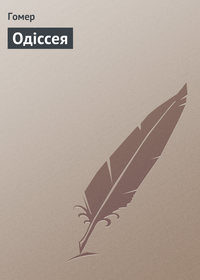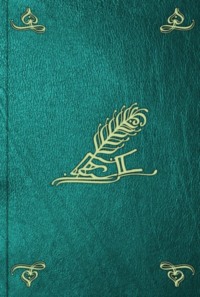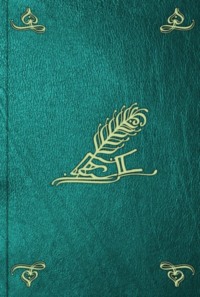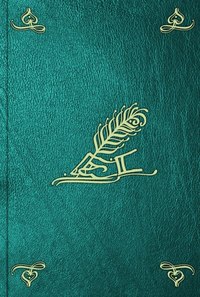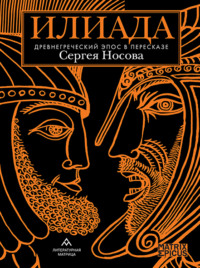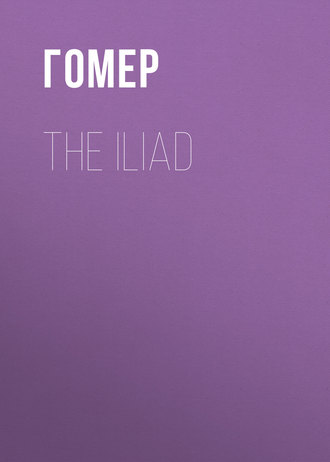 полная версия
полная версияThe Iliad
And him then answered Hera the ox-eyed queen: "Shaker of earth, thyself with thine own mind take counsel, whether thou wilt save Aineias, or leave him [to be slain, brave though he be, by Achilles, Peleus' son]. For by many oaths among all the Immortals have we two sworn, even Pallas Athene and I, never to help the Trojans from their evil day, not even when all Troy shall burn in the burning of fierce fire, and they that burn her shall be the warlike sons of the Achaians."
Now when Poseidon Shaker of earth heard that, he went up amid the battle and the clash of spears, and came where Aineias and renowned Achilles were. Then presently he shed mist over the eyes of Achilles, Peleus' son, and drew the bronze-headed ashen spear from the shield of Aineias great of heart, and set it before Achilles' feet, and lifted Aineias and swung him high from off the earth. Over many ranks of warriors, of horses many, sprang Aineias soaring in the hand of the god, and lighted at the farthest verge of the battle of many onsets, where the Kaukones were arraying them for the fight. Then hard beside him came Poseidon, Shaker of earth, and spake aloud to him winged words: "Aineias, what god is it that biddeth thee fight infatuate against Peleus' vehement son, who is both a better man than thou and dearer to Immortals? Rather withdraw thee whensoever thou fallest in with him, lest even contrary to thy fate thou enter the house of Hades. But when Achilles shall have met his death and doom, then be thou of good courage to fight among the foremost, for there shall none other of the Achaians slay thee."
He spoke, and left him there, when he had shown him all these things. Then quickly from Achilles' eyes he purged the magic mist; and he stared with wide eyes, and in trouble spake unto his proud soul: "Ha! verily a great marvel behold I here with mine eyes. My spear lieth here upon the ground, nor can I anywise see the man at whom I hurled it with intent to slay him. Truly then is Aineias likewise dear to the immortal gods, howbeit I deemed that his boosting thereof was altogether vanity. Away with him! not again will he find heart to make trial of me, now that once more he has escaped death to his joy. But come, I will call on the warlike Danaans and go forth to make trial of some other Trojan face to face."
He said, and leapt along the lines, and called upon each man: "No longer stand afar from the men of Troy, noble Achaians, but come let man match man and throw his soul into the fight. Hard is it for me, though I be strong, to assail so vast a folk and fight them all: not even Ares, though an immortal god, nor Athene, could plunge into the jaws of such a fray and toil therein. But to my utmost power with hands and feet and strength no whit, I say, will I be slack, nay, never so little, but right through their line will I go forward, nor deem I that any Trojan shall be glad who shall come nigh my spear."
Thus spake he urging them. But to the Trojans glorious Hector called aloud, and proclaimed that he would go forth against Achilles: "High-hearted Trojans, fear not Peleus' son. I too in words could fight even Immortals, but with the spear it were hard, for they are stronger far. Neither shall Achilles accomplish all his talk, but part thereof he is to accomplish, and part to break asunder in the midst. And against him will I go forth, though the hands of him be even as fire, yea though his hands be as fire and his fierceness as the flaming steel."
Thus spake he urging them, and the Trojans raised their spears for battle; and their fierceness was mingled confusedly, and the battle-cry arose. Then Phoebus Apollo stood by Hector and spake to him: "Hector, no longer challenge Achilles at all before the lines, but in the throng await him and from amid the roar of the battle, lest haply he spear thee or come near and smite thee with his sword."
Thus spake he, and Hector again fell back into the crowd of men, for he was amazed when he heard the sound of a god's voice.
But Achilles sprang in among the Trojans, his heart clothed with strength, crying his terrible cry, and first he took Iphition, Otrynteus' valiant son, a leader of much people, born of a Naiad nymph to Otrynteus waster of cities, beneath snowy Tmolos, in Hyde's rich domain. Him as he came right on did goodly Achilles smite with his hurled spear, down through the midst of his head, and it was rent asunder utterly. And he fell with a crash, and goodly Achilles exulted over him; "here is thy death, thy birth was on the Gygaian lake, where is thy sire's demesne, by Hyllos rich in fish and eddying Hermos."
Thus spake he exultant, but darkness fell upon the eyes of Iphition: him the chariots of the Achaians clave with their tires asunder in the forefront of the battle, and over him Achilles pierced in the temples, through his bronze-cheeked helmet, Demoleon, brave stemmer of battle, Antenor's son. No stop made the bronze helmet, but therethrough sped the spear-head and clave the bone, and the brain within was all scattered: that stroke made ending of his zeal. Then Hippodamas, as he leapt from his chariot and fled before him, Achilles wounded in the back with his spear: and he breathed forth his spirit with a roar, as when a dragged bull roareth that the young men drag to the altar of the Lord of Helike; for in such hath the Earthshaker his delight: thus roared Hippodamas as from his bones fled forth his haughty spirit. But Achilles with his spear went on after godlike Polydoros, Priam's son. Him would his sire continually forbid to fight, for that among his children he was youngest born and best beloved, and overcame all in fleetness of foot. Just then in boyish folly, displaying the swiftness of his feet, he was rushing through the forefighters, until he lost his life. Him in the midst did fleet-footed noble Achilles smite with a javelin, in his back as he darted by, where his belt's golden buckles clasped, and the breast and back plates overlapped: and right through beside the navel went the spear-head, and he fell on his knee with a cry, and dark cloud covered him round about, and he clasped his bowels to him with his hands as he sank.
Then when Hector saw his brother Polydoros clasping his bowels with his hands, and sinking to the earth, a mist fell over his eyes, nor longer might he endure to range so far apart, but he came up against Achilles brandishing his sharp spear, and like flame of fire. And Achilles when he saw him, sprang up, and spake exultingly: "Behold the man who hath deepest stricken into my soul, who slew my dear-prized friend; not long shall we now shrink from each other along the highways of the war."
He said, and looking grimly spake unto goodly Hector: "Come thou near, that the sooner thou mayest arrive at the goal of death."
Then to him, unterrified, said Hector of the glancing helm: "Son of Peleus, think not with words to affright me as a child, since I too know myself how to speak taunts and unjust speech. And I know that thou art a man of might, and a far better man than I. Yet doth this issue lie in the lap of the gods, whether I though weaker shall take thy life with my hurled spear, for mine too hath been found keen ere now."
He said, and poised his spear and hurled it, and Athene with a breath turned it back from glorious Achilles, breathing very lightly; and it came back to goodly Hector, and fell there before his feet. Then Achilles set fiercely upon him, eager to slay him, crying his terrible cry. But Apollo caught Hector up, very easily, as a god may, and hid him in thick mist. Thrice then did fleet-footed noble Achilles make onset with his spear of bronze, and thrice smote the thick mist. [But when the fourth time he had come godlike on,] then with dread shout he spake to him winged words: "Dog, thou art now again escaped from death; yet came ill very nigh thee; but now hath Phoebus Apollo saved thee, to whom thou must surely pray when thou goest forth amid the clash of spears. Verily I will slay thee yet when I meet thee hereafter, if any god is helper of me too. Now will I make after the rest, whomsoever I may seize."
Thus speaking he pierced Dryops in the midst of his neck with his spear, and he fell down before his feet. But he left him where he lay, and hurled at Demuchos Philetor's son, a good man and a tall, and stayed him with a stroke upon his knees; then smote him with his mighty sword and reft him of life. Then springing on Laogonos and Dardanos, sons of Bias, he thrust both from their chariot to the ground, one with a spear-cast smiting and the other in close battle with his sword. Then Tros, Alastor's son – he came and clasped his knees to pray him to spare him, and let him live, and slay him not, having compassion on his like age, fond fool, and knew not that he might not gain his prayers; for nowise soft of heart or tender was that man, but of fierce mood – with his hands he touched Achilles' knees, eager to entreat him, but he smote him in the liver with his sword, and his liver fell from him, and black blood therefrom filled his bosom, and he swooned, and darkness covered his eyes. Then Achilles came near and struck Mulios in the ear, and right through the other ear went the bronze spear-head. Then he smote Agenor's son Echeklos on the midst of the head with his hilted sword, and all the sword grew hot thereat with blood; and dark death seized his eyes, and forceful fate. Then next Deukalion, just where the sinews of the elbow join, there pierced he him through the forearm with his bronze spear-head; so abode he with his arm weighed down, beholding death before him; and Achilles smiting the neck with his sword swept far both head and helm, and the marrow rose out of the backbone, and the corpse lay stretched upon the earth. Then went he onward after Peires' noble son, Rhigmos, who had come from deep-soiled Thrace: him in the midst he smote with his hurled javelin, and the point fixed in his lung, and he fell forth of his chariot. And Areithoos his squire, as he turned the horses round, he pierced in the back with his sharp spear, and thrust him from the car, and the horse ran wild with fear.
As through deep glens rageth fierce fire on some parched mountain-side, and the deep forest burneth, and the wind driving it whirleth every way the flame, so raged he every way with his spear, as it had been a god, pressing hard on the men he slew; and the black earth ran with blood. For even as when one yoketh wide-browed bulls to tread white barley in a stablished threshing-floor, and quickly is it trodden out beneath the feet of the loud-lowing bulls, thus beneath great-hearted Achilles his whole-hooved horses trampled corpses and shields together; and with blood all the axletree below was sprinkled and the rims that ran around the car, for blood-drops from the horses' hooves splashed them, and blood-drops from the tires of the wheels. But the son of Peleus pressed on to win him glory, flecking with gore his irresistible hands.
BOOK XXI
How Achilles fought with the River, and chased the men of Troy within their gates.
But when now they came unto the ford of the fair-flowing river, even eddying Xanthos, whom immortal Zeus begat, there sundering them he chased the one part to the plain toward the city, even where the Achaians were flying in affright the day before, when glorious Hector was in his fury – thither poured some in flight, and Hera spread before them thick mist to hinder them: – but half were pent into the deep-flowing silver eddied river, and fell therein with a mighty noise, and the steep channel sounded, and the banks around rang loudly; for with shouting they swam therein hither and thither whirled round the eddies. And as when at the rush of fire locusts take wing to fly unto a river, and the unwearying fire flameth forth on them with sudden onset, and they huddle in the water; so before Achilles was the stream of deep-eddying Xanthos filled with the roar and the throng of horses and men.
Then the seed of Zeus left behind him his spear upon the bank, leant against tamarisk bushes, and leapt in, as it were a god, keeping his sword alone, and devised grim work at heart, and smote as he turned him every way about: and their groaning went up ghastly as they were stricken by the sword, and the water reddened with blood. As before a dolphin of huge maw fly other fish and fill the nooks of some fair-havened bay, in terror, for he devoureth amain whichsoever of them he may catch; so along the channels of that dread stream the Trojans crouched beneath the precipitous sides. And when his hands were weary of slaughter he chose twelve young men alive out of the river, an atonement for Patroklos, Menoitios' son that was dead. These brought he forth amazed like fawns, and bound behind them their hands with well-cut thongs, which they themselves wore on their pliant doublets, and gave them to his comrades to lead down to the hollow ships. Then again he made his onset, athirst for slaying.
There met he a son of Dardanid Priam, in flight out of the river, Lykaon, whom once himself he took and brought unwilling out of his father's orchard, in a night assault; he was cutting with keen bronze young shoots of a wild fig tree, to be hand-rails of a chariot; but to him an unlooked-for bane came goodly Achilles. And at that time he sold him into well-peopled Lemnos, sending him on ship board, and the son of Jason gave a price for him; and thence a guest friend freed him with a great ransom, Eetion of Imbros, and sent him to goodly Arisbe; whence flying secretly he came to his father's house. Eleven days he rejoiced among his friends after he was come from Lemnos, but on the twelfth once more God brought him into the hands of Achilles, who was to send him to the house of Hades though nowise fain to go. Him when fleet-footed noble Achilles saw bare of helm and shield, neither had he a spear, but had thrown all to the ground; for he sweated grievously as he tried to flee out of the river, and his knees were failing him for weariness: then in wrath spake Achilles to his great heart: "Ha! verily great marvel is this that I behold with my eyes. Surely then will the proud Trojans whom I have slain rise up again from beneath the murky gloom, since thus hath this man come back escaped from his pitiless fate, though sold into goodly Lemnos, neither hath the deep of the hoary sea stayed him, that holdeth many against their will. But come then, of our spear's point shall he taste, that I may see and learn in my mind whether likewise he shall come back even from beneath, or whether the life-giving Earth shall hold him down, she that holdeth so even the strong."
Thus pondered he in his place; but the other came near amazed, fain to touch his knees, for his soul longed exceedingly to flee from evil death and black destruction. Then goodly Achilles lifted his long spear with intent to smite him, but he stooped and ran under it and caught his knees; and the spear went over his back and stood in the ground, hungering for flesh of men. Then Lykaon besought him, with one hand holding his knees, while with the other he held the sharp spear and loosed it not, and spake to him winged words: "I cry thee mercy, Achilles; have thou regard and pity for me: to thee, O fosterling of Zeus, am I in the bonds of suppliantship. For at thy table first I tasted meal of Demeter on the day when thou didst take me captive in the well-ordered orchard, and didst sell me away from my father and my friends unto goodly Lemnos, and I fetched thee the price of a hundred oxen. And now have I been ransomed for thrice that, and this is my twelfth morn since I came to Ilios after much pain. Now once again hath ruinous fate delivered me unto thy hands; surely I must be hated of father Zeus, that he hath given me a second time unto thee; and to short life my mother bare me, Laothoe, old Altes' daughter – Altes who ruleth among the war-loving Leleges, holding steep Pedasos on the Satnioeis. His daughter Priam had to wife, with many others, and of her were we two born, and thou wilt butcher both. Him among the foremost of the foot-soldiers didst thou lay low, even godlike Polydoros, when thou smotest him with they sharp spear: and now will it go hard with me here, for no hope have I to escape thy hands, since God hath delivered me thereunto. Yet one thing will I tell thee, and do thou lay it to heart: slay me not, since I am not of the same mother as Hector, who slew thy comrade the gentle and brave."
Thus spake to him the noble son of Priam, beseeching him with words, but he heard a voice implacable: "Fond fool, proffer me no ransom, nor these words. Until Patroklos met his fated day, then was it welcomer to my soul to spare the men of Troy, and many I took alive and sold beyond the sea: but now there is none shall escape death, whomsoever before Ilios God shall deliver into my hands – yes, even among all Trojans, but chiefest among Priam's sons. Ay, friend, thou too must die: why lamentest thou? Patroklos is dead, who was better far than thou. Seest thou not also what manner of man am I for might and goodliness? and a good man was my father, and a goddess mother bare me. Yet over me too hang death and forceful fate. There cometh morn or eve or some noonday when my life too some man shall take in battle, whether with spear he smite or arrow from the string."
Thus spake he, and the other's knees and heart were unstrung. He let go Achilles' spear, and sat with both hands outspread. But Achilles drew his sharp sword and smote on the collar-bone beside the neck, and all the two-edged sword sank into him, and he lay stretched prone upon the earth, and blood flowed dark from him and soaked the earth. Him seized Achilles by the foot and sent him down the stream, and over him exulting spake winged words: "There lie thou among the fishes, which shall lick off thy wound's blood heedlessly, nor shall thy mother lay thee on a bed and mourn for thee, but Skamandros shall bear thee on his eddies into the broad bosom of the sea. Leaping along the wave shall many a fish dart up to the dark ripple to eat of the white flesh of Lykaon. So perish all, until we reach the citadel of sacred Ilios, ye flying and I behind destroying. Nor even the River, fair-flowing, silver-eddied, shall avail you, to whom long time forsooth ye sacrifice many bulls, and among his eddies throw whole-hooved horses down alive. For all this yet shall ye die the death, until ye pay all for Patroklos' slaying and the slaughter of Achaians whom at the swift ships ye slew while I tarried afar."
Thus spake he, but the River waxed ever more wroth in his heart, and sought in his soul how he should stay goodly Achilles from his work, and ward destruction from the Trojans. Meanwhile the son of Peleus with his far-shadowing spear leapt, fain to slay him, upon Asteropaios son of Pelegon, whom wide-flowing Axios begat of Periboia eldest of the daughters of Akessamenos. Upon him set Achilles, and Asteropaios stood against him from the river, holding two spears; for Xanthos put courage into his heart, being angered for the slaughtered youths whom Achilles was slaughtering along the stream and had no pity on them. Then when the twain were come nigh in onset on each other, unto him first spake fleet-footed noble Achilles: "Who and whence art thou of men, that darest to come against me? Ill-fated are they whose children match them with my might."
And to him, made answer Pelegon's noble son: "High-hearted son of Peleus, why askest thou my lineage? I come from deep-soiled Paionia, a land far off, leading Paionian men with their long spears, and this now is the eleventh morn since I am come to Ilios. My lineage is of wide-flowing Axios, who begat Pelegon famous with the spear, and he, men say, was my father. Now fight we, noble Achilles!"
Thus spake he in defiance, and goodly Achilles lifted the Pelian ash: but the warrior Asteropaios hurled with both spears together, for he could use both hands alike, and with the one spear smote the shield, but pierced it not right through, for the gold stayed it, the gift of a god; and with the other he grazed the elbow of Achilles' right arm, and there leapt forth dark blood, but the point beyond him fixed itself in the earth, eager to batten on flesh. Then in his turn Achilles hurled on Asteropaios his straight-flying ash, fain to have slain him, but missed the man and struck the high bank, and quivering half its length in the bank he left the ashen spear. Then the son of Peleus drew his sharp sword from his thigh and leapt fiercely at him, and he availed not to draw with his stout hand Achilles' ashen shaft from the steep bank. Thrice shook he it striving to draw it forth, and thrice gave up the strain, but the fourth time he was fain to bend and break the ashen spear of the seed of Aiakos, but ere that Achilles closing on him reft him of life with his sword. For in the belly he smote him beside the navel, and all his bowels gushed out to the earth, and darkness covered his eyes as he lay gasping. Then Achilles trampling on his breast stripped off his armour and spake exultingly: "Lie there! It is hard to strive against children of Kronos' mighty son, even though one be sprung from a River-god. Thou truly declarest thyself the seed of a wide-flowing River, but I avow me of the linkage of great Zeus. My sire is a man ruling many Myrmidons, Peleus the son of Aiakos, and Aiakos was begotten of Zeus. As Zeus is mightier than seaward-murmuring rivers, so is the seed of Zeus made mightier than the seed of a river. Nay, there is hard beside thee a great river, if he may anywise avail; but against Zeus the son of Kronos it is not possible to fight. For him not even king Acheloios is match, nor yet the great strength of deep-flowing Ocean, from whom all rivers flow and every sea, and all springs and deep wells: yea, even he hath fear of the lightning of great Zeus and his dread thunder, when it pealeth out of heaven."
He said, and from the steep bank drew his bronze spear, and left there Asteropaios whom he had slain, lying in the sands, and the dark water flooded him. Around him eels and fishes swarmed, tearing and gnawing the fat about his kidneys. But Achilles went on after the charioted Paiones who still along the eddying river huddled in fear, when they saw their best man in the stress of battle slain violently by the hands and the sword of the son of Peleus. There slew he Thersilochos and Mydon and Astypylos and Mnesos and Thrasios and Ainios and Ophelestes; and more yet of the Paiones would swift Achilles have slain, had not the deep-eddying River called unto him in wrath, in semblance of a man, and from an eddy's depth sent forth a voice: "O Achilles, thy might and thy evil work are beyond the measure of men; for gods themselves are ever helping thee. If indeed the son of Kronos hath delivered thee all the Trojans to destroy, at least drive them forth from me and do thy grim deeds on the plain, for filled with dead men is my pleasant bed, nor can I pour my stream to the great sea, being choked with dead, and thou slayest ruthlessly. Come then, let be; I am astonished, O captain of hosts."
And to him answered Achilles fleet of foot: "So be it, heaven-sprung Skamandros, even as thou biddest. But the proud Trojans I will not cease from slaying until I have driven them into their city, and have made trial with Hector face to face whether he is to vanquish me or I him."
Thus saying, he set upon the Trojans, like a god. Then unto Apollo spake the deep-eddying River: "Out on it, lord of the silver bow, child of Zeus, thou hast not kept the ordinance of Kronos' son, who charged thee straitly to stand by the Trojans and to help them, until eve come with light late-setting, and darken the deep-soiled earth."
He said, and spear-famed Achilles sprang from the bank and leapt into his midst; but he rushed on him in a furious wave, and stirred up all his streams in tumult, and swept down the many dead who lay thick in him, slain by Achilles; these out to land he cast with bellowing like a bull, and saved the living under his fair streams, hiding them within eddies deep and wide. But terribly around Achilles arose his tumultuous wave, and the stream smote violently against his shield, nor availed he to stand firm upon his feet. Then he grasped a tall fair-grown elm, and it fell uprooted and tore away all the bank, and reached over the fair river bed with its thick shoots, and stemmed the River himself, falling all within him: and Achilles, struggling out of the eddy, made haste to fly over the plain with his swift feet, for he was afraid. But the great god ceased not, but arose upon him with darkness on his crest, that he might stay noble Achilles from slaughter, and ward destruction from the men of Troy. And the son of Peleus rushed away a spear's throw, with the swoop of a black eagle, the mighty hunter, strongest at once and swiftest of winged birds. Like him he sped, and on his breast the bronze rang terribly as he fled from beneath the onset, and behind him the River rushed on with a mighty roar. As when a field-waterer from a dark spring leadeth water along a bed through crops and garden grounds, a mattock in his hands, casting forth hindrances from the ditch, and as it floweth all pebbles are swept down, and swiftly gliding it murmureth down a sloping place, and outrunneth him that is its guide: – thus ever the river wave caught up Achilles for all his speed; for gods are mightier than men. For whensoever fleet-footed noble Achilles struggled to stand against it, and know whether all immortals be upon him who inhabit spacious heaven, then would a great wave of the heaven-sprung River beat upon his shoulders from above, and he sprang upward with his feet, sore vexed at heart; and the River was wearying his knees with violent rush beneath, devouring the earth from under his feet. Then the son of Peleus cried aloud, looking up to the broad heaven: "Zeus, Father, how doth none of the gods take it on him in pity to save me from the River! after that let come to me what may. None other of the inhabitants of Heaven is chargeable so much, but only my dear mother, who beguiled me with false words, saying that under the wall of the mail-clad men of Troy I must die by the swift arrows of Apollo. Would that Hector had slain me, the best of men bred here: then brave had been the slayer, and a brave man had he slain. But now by a sorry death am I doomed to die, pent in this mighty river, like a swineherd boy whom a torrent sweepeth down as he essayeth to cross it in a storm."


